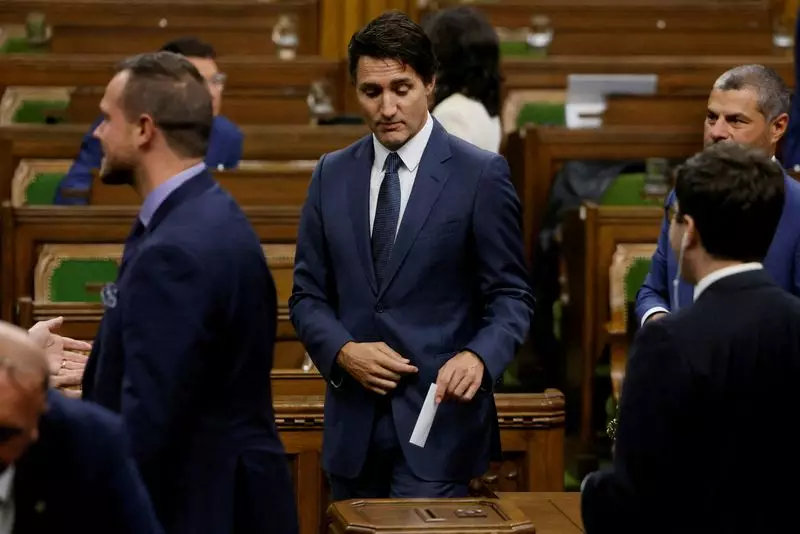In recent times, Canadian politics has taken on an air of unpredictability, particularly for the ruling Liberal Party under Prime Minister Justin Trudeau. With the results of a crucial special election in Montreal’s LaSalle—Emard—Verdun likely to set the tone for the party’s future, the stakes have never been higher. Historically considered a bastion for the Liberal Party, this constituency now presents a formidable challenge. Recent polls indicate a significant drop in support for the Liberals, leading to speculation about Trudeau’s ability to lead the party effectively moving forward.
As Canada approaches a federal election slated for late 2025, the Liberal Party is feeling the pressure—not just from their political opponents but also internally. The dissatisfaction amongst constituents is visible and troubling, prompting concern among party members regarding Trudeau’s leadership.
In the wake of deteriorating public support, a surprising number of Liberal MPs have started voicing their concerns regarding Trudeau’s leadership. Alexandra Mendes, a notable Liberal figure representing a Quebec constituency, has openly declared that her constituents have expressed desires for a new leader. This defection from party unity is a clear indication of mounting pressure within the ranks, as Mendes indicated, “I didn’t hear it from two, three people – I heard it from dozens and dozens of people.” This sentiment resonates with citizens who feel let down by an administration that had previously promised so much.
The unpopularity surrounding Trudeau has become more pronounced as the looming election draws nearer. Trudeau is adamant about leading the party into the approaching election; however, his confidence appears increasingly misplaced as evident discontent brews amongst party loyalists.
The impending election comes at a time of financial distress for many Canadians. Rising prices and a housing crisis have left citizens grappling with severe economic dilemmas. Trudeau himself acknowledged these frustrations, stating that Canadian households are burdened by a high cost of living while emphasizing the necessity for change. Ironically, his government faces criticism for failing to rectify the very issues that now threaten to dismantle his party’s political legacy.
Opposition leader Pierre Poilievre has seized upon this growing dissatisfaction, positioning himself as a champion for those bearing the brunt of elevated costs. His critique includes promises to eliminate the federal carbon tax, which he argues exacerbates financial burdens for citizens. Moreover, Poilievre’s proposition to limit immigration until housing solutions are realized aligns with a growing frustration among voters, making his message resonate effectively in light of economic uncertainty.
A Shift in the Political Narrative
The latest poll results paint a dismal picture for the Liberal Party, placing them at a meager 25% while the Conservatives soar to a remarkable 45% approval rating. Comparatively, during the last general election in 2021, the Liberal Party held a comfortable 43% in LaSalle—Emard—Verdun. The political dynamic appears to have shifted dramatically, indicating that constituents are re-evaluating their loyalties. The potential loss in a traditionally Liberal stronghold could provoke broader calls for change, not just from the electorate but within the party itself.
As the special election approaches, the emerging narrative reveals more than party affiliations; it exposes a critical juncture in Canadian politics. Trudeau’s administration must grapple with public disapproval while attempting to cast Poilievre in a negative light, associating him with the divisive policies of previous conservative movements in North America.
The Final Countdown
As Canadians prepare to cast their votes, the implications of this election go well beyond the immediate outcome. The Liberal Party’s ability to retain its foothold in LaSalle—Emard—Verdun will undoubtedly reverberate, influencing the party’s course leading up to the federal elections. The uncertainty looming over Trudeau’s leadership will not only dictate the future of the Liberal Party but also shape Canadian political discourse in the coming years.
With rising concerns over economic policies, public discontent, and internal challenges, the Liberals stand at a pivotal moment. Whether they will adapt to the changing tides or continue to cling to an outdated leadership model remains to be seen. Whatever the outcome, one thing is clear: the political landscape in Canada is evolving, and those who fail to engage with the realities facing their constituents risk being swept away in the wave of change.

